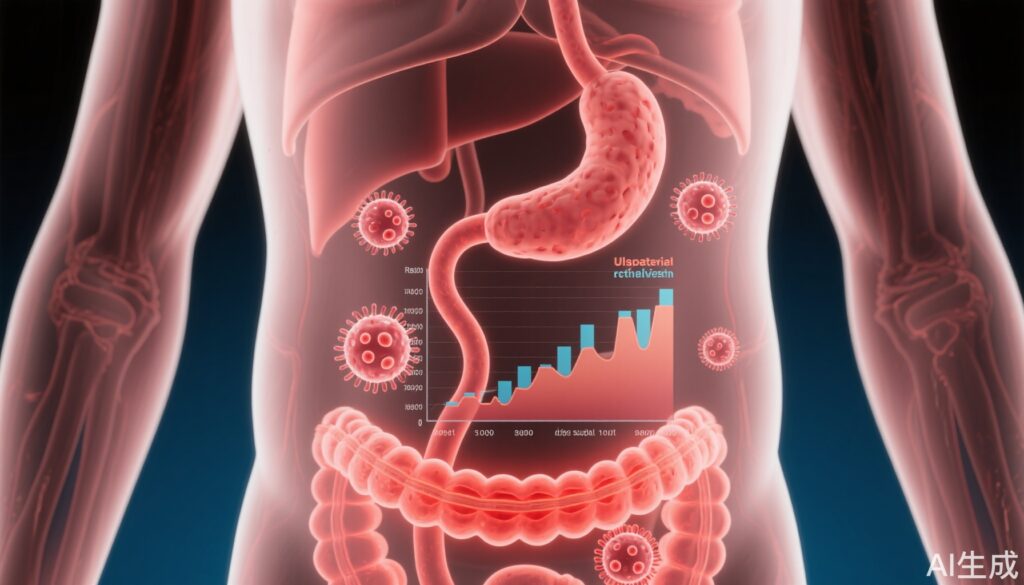Highlight
1. The ACCURE trial provides the first robust evidence that appendicectomy combined with standard medical therapy is superior to medical therapy alone in maintaining remission in ulcerative colitis (UC).
2. One-year relapse rates were significantly lower in the appendicectomy plus medical therapy group (36%) compared to medical therapy alone (56%).
3. Appendicectomy was generally safe, with only minor adverse events and no mortality reported over 1 year.
4. Findings underscore a possible immunomodulatory role of the appendix in UC pathophysiology and suggest laparoscopic appendicectomy might be a novel adjunct in UC management.
Study Background and Disease Burden
Ulcerative colitis is a chronic inflammatory bowel disease (IBD) characterized by relapsing and remitting mucosal inflammation limited primarily to the colon. Maintaining remission is a major challenge as relapses impair quality of life and can lead to complications. Current maintenance strategies rely primarily on medical therapies including mesalazine, immunomodulators, and biologic agents. However, relapse rates remain substantial, and long-term medication exposure carries risks and costs.
Emerging evidence suggests the appendix acts as an immunomodulatory organ, influencing gut mucosal immunity. Epidemiological data implied an inverse association between prior appendicectomy and risk or course of UC, raising interest in appendicectomy as a potential therapeutic intervention to maintain remission. Prior to the ACCURE trial, no large-scale randomized controlled trials rigorously evaluated the efficacy of appendicectomy in this context.
Study Design
The ACCURE trial was a pragmatic, open-label, international, randomized controlled superiority trial conducted across 22 centers in the Netherlands, Ireland, and the UK, registered with the Netherlands Trial Register (NTR2883) and ISRCTN (ISRCTN60945764).
Eligible patients included those with established ulcerative colitis in clinical remission but who experienced a disease relapse requiring treatment within the past 12 months. Participants were randomized 1:1 to either laparoscopic appendicectomy plus continued maintenance medical therapy (intervention) or maintenance medical therapy alone (control). Medical therapy was continued in both arms per standard care, ensuring comparability.
Randomization employed a central computer-generated allocation with concealment and was stratified by disease extent to balance groups. Due to the nature of the intervention, neither patients nor treating physicians were blinded.
The primary outcome was the proportion of patients experiencing disease relapse within one year. Relapse was stringently defined as a total Mayo score ≥5 with an endoscopic subscore of 2 or 3, or, if endoscopy was unavailable, a masked independent adjudication committee confirmed clinical and biochemical evidence of relapse including symptom exacerbation, rectal bleeding, elevated faecal calprotectin >150 μg/g, or treatment intensification beyond mesalazine.
Analyses were intention-to-treat, ensuring robustness of findings despite the pragmatic design. Recruitment spanned a decade (2012–2022), with 201 patients randomized.
Key Findings
Out of 1386 screened patients, 201 were randomized into two nearly equal groups: 101 allocated to appendicectomy plus medical therapy and 100 to medical therapy alone. After excluding four patients for eligibility violations, 99 in the appendicectomy group and 98 in controls were included in the primary analysis.
The 1-year relapse rate was significantly reduced in the appendicectomy group (36/99; 36%) versus controls (55/98; 56%). The relative risk (RR) of relapse was 0.65 (95% CI, 0.47 to 0.89; p=0.005), remaining significant after adjustment for disease extent (adjusted p=0.002). This indicates a 35% relative reduction in relapse risk conferred by appendicectomy.
Regarding safety, adverse events were comparable between groups (11% appendicectomy vs. 10% control). Most frequent adverse events included transient postoperative self-limiting abdominal pain in appendicectomy patients (3%) and skin rash in controls (3%). Serious adverse events occurred in 2% (n=2) of appendicectomy patients and none in controls. Notably, 2 (2%) appendiceal specimens harbored incidental low-grade mucinous neoplasms, highlighting a potential secondary diagnostic advantage of appendicectomy.
No deaths occurred in either arm during the study period. These safety data support the tolerability of laparoscopic appendicectomy as adjunctive therapy.
Expert Commentary
The ACCURE trial represents a landmark randomized study providing high-level evidence for appendicectomy as a novel strategy to maintain remission in UC. The rationale hinges on the appendix’s immunological role. The appendix is rich in gut-associated lymphoid tissue, modulating mucosal immune responses. Its removal may attenuate pro-inflammatory pathways contributing to relapse.
This trial’s pragmatic design maximizes generalizability. However, the open-label nature might introduce performance bias, although the objective primary endpoint and independent adjudication mitigate this concern. Longer-term outcomes and quality-of-life measures require further study.
Interestingly, incidental discovery of low-grade appendiceal mucinous neoplasm suggests a potential dual benefit of appendicectomy by identifying early neoplastic processes. Prior epidemiological studies corroborate a protective effect of prior appendicectomy against UC development, and this trial extends the therapeutic implications into remission maintenance.
Incorporation of appendicectomy into clinical practice for UC remission maintenance warrants individualized patient counseling weighing benefits against surgical risks and patient preferences. Future research should explore mechanistic insights, durability of remission, and cost-effectiveness analyses.
Conclusion
The ACCURE trial conclusively demonstrates that laparoscopic appendicectomy combined with standard medical therapy significantly reduces the 1-year relapse rate in patients with ulcerative colitis in remission, compared to medical therapy alone. Appendicectomy was safe and well tolerated, with minimal serious adverse events. These results highlight the therapeutic potential of appendicectomy as an adjunct in UC management and support the immunomodulatory role of the appendix in disease pathogenesis.
This evidence may shift clinical paradigms for managing UC remission, offering a novel surgical option to complement pharmacotherapy. Nevertheless, extended follow-up and broader clinical implementation studies are needed before routine adoption. Meanwhile, clinicians should consider appendicectomy as a valuable option for eligible patients at high relapse risk under multidisciplinary evaluation.
References
1. de Buck van Overstraeten A, et al. Appendicectomy plus standard medical therapy versus standard medical therapy alone for maintenance of remission in ulcerative colitis (ACCURE): a pragmatic, open-label, international, randomised trial. Lancet Gastroenterol Hepatol. 2023.
2. Shen B. The Role of the Appendix in Inflammatory Bowel Disease. Inflamm Bowel Dis. 2020;26(4):497-505.
3. Myrelid P, et al. Appendectomy and the risk of inflammatory bowel disease: a nationwide cohort study. Scand J Gastroenterol. 2017;52(7):766-773.
4. Harvey RF, Bradshaw JM. A Simple Index of Crohn’s-Disease Activity. Lancet. 1980;1(8167):514.
5. Schroeder KW, et al. Coated Oral 5-Aminosalicylic Acid Therapy for Mild to Moderate Ulcerative Colitis. N Engl J Med. 1987;317(26):1625-9.



